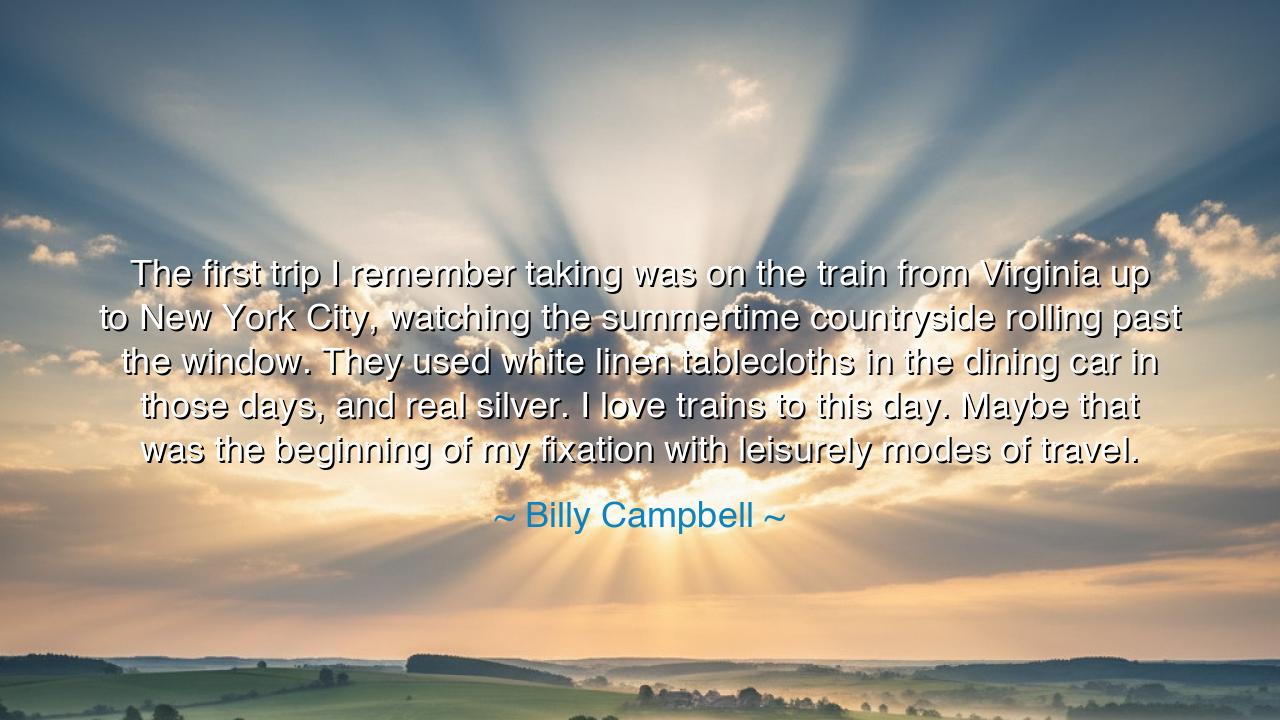
The first trip I remember taking was on the train from Virginia
The first trip I remember taking was on the train from Virginia up to New York City, watching the summertime countryside rolling past the window. They used white linen tablecloths in the dining car in those days, and real silver. I love trains to this day. Maybe that was the beginning of my fixation with leisurely modes of travel.






Billy Campbell, reflecting on the earliest stirrings of his wanderer’s heart, once said: “The first trip I remember taking was on the train from Virginia up to New York City, watching the summertime countryside rolling past the window. They used white linen tablecloths in the dining car in those days, and real silver. I love trains to this day. Maybe that was the beginning of my fixation with leisurely modes of travel.” In this tender recollection, he gives voice to a universal truth: that the earliest journeys of our youth often shape our spirit, and that in the rhythm of travel we discover not merely new lands, but something enduring about ourselves.
When Campbell speaks of trains, he is not describing mere machines of steel and steam, but vessels of memory and wonder. The dining car with its white linen and real silver is more than nostalgia—it is a reminder of an age when travel was not only about arriving, but about the dignity of the journey itself. The rolling countryside glimpsed through the train’s window was a living canvas, unfolding slowly, teaching the young traveler to savor life’s passage rather than rush through it. This is why his heart was forever touched, and why he would carry within him a devotion to leisurely modes of travel.
The ancients too cherished this wisdom: that the journey itself is sacred. The Greeks told stories of Odysseus, whose voyage home took decades, filled with trials and wonders. The end of the story mattered, yes, but so too did the long passage, for it shaped the man who returned. Likewise, Campbell’s fixation on slow travel echoes this timeless truth: that the meaning of travel is not always the destination, but the transformation of the traveler as he moves, unhurried, through the world.
History also offers examples of the power of leisurely travel. Consider the Grand Tour of the eighteenth century, when young men of Europe, especially from Britain, were sent across the continent to absorb culture, art, and philosophy. Their journeys were not hasty; they lingered in Rome, Venice, and Paris, learning patience, reflection, and the art of living well. This tradition, like Campbell’s memory of the train, reveals that when travel is unhurried, it deepens the mind and ennobles the soul.
But Campbell’s words also carry a subtle warning. In our modern age, men worship speed. Airplanes cut hours into minutes, and cars race across highways without pause for reflection. We rush from place to place, treating journeys as inconveniences rather than experiences. Yet in this haste, we lose something vital—the beauty of watching the countryside roll past the window, the quiet dignity of shared meals with strangers, the chance to let time itself breathe. To be fixated on speed is to risk forgetting how to live.
The deeper meaning of Campbell’s words is an invitation: to reclaim the art of leisure in travel, and by extension, in life itself. To slow down is not to waste time; it is to enrich it. The train becomes a metaphor for living—steady, rhythmic, offering views that can only be seen when we choose not to hurry. The child on the train from Virginia to New York was not only learning how to travel—he was learning how to see, how to savor, how to love the journey of existence.
Thus, the lesson for us is clear: do not measure your travels, or your life, by how quickly you arrive. Take time to pause, to notice, to let the world unfold before you like the fields and forests through a train’s glass. Seek not only efficiency but beauty. Cherish not only destinations but the path that carries you there. For in those moments of slowness, your soul gathers treasures far richer than speed can ever deliver.
So, O listener, take to heart Billy Campbell’s wisdom: love trains, love the slow passage, love the leisure of travel. Let every journey—whether across the earth or through the days of your life—be a chance to savor rather than to rush. For those who hurry only to arrive may find that they missed the very life they sought, but those who move with patience will discover that the journey itself is the true home of joy.






AAdministratorAdministrator
Welcome, honored guests. Please leave a comment, we will respond soon